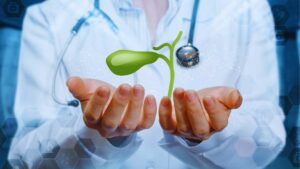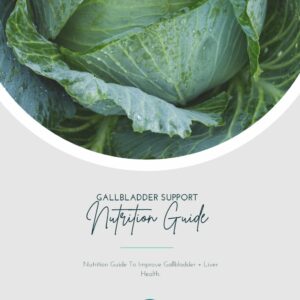How Does Having High Cholesterol Promote Gallstone Formation?
Did you know that 31% of Americans, over 73 million people, have high cholesterol?
And while having high cholesterol levels can be quite concerning, high cholesterol is more complex than the recommendation of lowering high cholesterol foods.
One thing that is often not discussed is the role of cholesterol in gallstone formation.
On your gallbladder journey, it’s extremely important to learn why cholesterol is important, what causes high cholesterol, and what steps to take to prevent or reduce cholesterol gallstones.
So today, as an integrative gallbladder nutritionist AND a gallbladder warrior myself, I wanted to give you a better understanding of both cholesterol and gallstones.
In this blog, we’ll discuss the effects of high cholesterol on our gallbladder health, as well as some tips to keep your cholesterol levels at an optimum level.
What is Cholesterol and its Role in the Body?
Cholesterol is often deemed as a bad thing, but it is essential to many bodily function.

It plays a vital role in various bodily functions, such as building cell membranes, producing hormones, and aiding in the digestion of fats. Cholesterol is SO important for:
- cell structure
- Vitamin D synthesis
- production of steroid and sex hormones: Cortisol, DHEA, Estrogen, aldosterone, and Progesterone
- Bile acids
Despite its essential functions, it’s fair to say that cholesterol has gained a reputation as a harmful substance.
One of the most important roles of cholesterol is that it helps with the formation of bile acids, which play a significant part in the digestion and absorption of fats.
These bile acids are stored in the gallbladder and released into the small intestine when necessary.
In a well-regulated system, the balance between cholesterol and bile acids ensures efficient digestion and the elimination of cholesterol through the bile.
However, when this balance is disrupted, excess cholesterol can accumulate in the gallbladder, leading to the formation of gallstones.
Gallstones are hardened deposits that can vary in size and composition, with cholesterol being the primary component in the majority of cases.
Understanding the involvement of cholesterol in digestion and bile production processes helps us resolve the complications of gallstone formation.
What Are Gallstones and How Are They Formed?
Gallstones are solid masses that develop in the gallbladder. Their size can range from a grain of sand to as large as a golf ball.
They form when substances in the bile, such as cholesterol or bilirubin, harden and accumulate in the gallbladder.
 Two main types of gallstones are cholesterol stones and pigment stones.
Two main types of gallstones are cholesterol stones and pigment stones.
Cholesterol stones, as the name suggests, are primarily composed of cholesterol. These account for about 80% of all gallstones.
On the other hand, pigment gallstones are made up of bilirubin which is a waste product formed during the breakdown of red blood cells.
The formation of cholesterol stones begins with an imbalance between cholesterol and bile salts in the bile.
When there is an excess of cholesterol and a decrease in bile salts, the cholesterol becomes supersaturated and forms solid crystals.
These crystals can grow and fuse to form larger and more solid gallstones over time.
The Connection Between Cholesterol Levels and Gallstone Formation
Our liver plays a vital role in maintaining a balance between cholesterol and bile salts.
It produces bile which is a digestive fluid that helps in the breakdown and absorption of fats.
On the other hand, bile salts that are present in bile, help with the emulsification of fats, meaning that it enables their easy digestion.
When there is an imbalance in this process, cholesterol can become supersaturated in the bile.
This occurs when the liver produces an excessive amount of cholesterol or if the gallbladder does not empty properly, leading to an accumulation of bile.
High cholesterol levels in the blood also play a significant role in the development of cholesterol gallstones.
When there is an excess of cholesterol circulating in the bloodstream, it can be absorbed into the bile, thereby increasing the risk of gallstone formation.
Risk Factors For Gallstone Formation Related to Cholesterol
If your cholesterol and LDL levels are chronically elevated we have to ask ourselvces why and what is causing the poor cholesterol metabolism in the liver:
Inflammation: What is driving inflammation in the body: diet, insulin resistance, overweight, viral infection, gut bacteria imbalance etc. Inflammation can be measured by CRP.
Thyroid dysfunction: Thyroid hormone has a direct effect on cholesterol levels. This can also apply for “subclinical” hypothyroid patients. If you have high cholesterol and gallbladder issues, it is extremely important you evaluate your thyroid health. Further blood work can be a great place to start. Suggested thyroid testing includes:TSH, reverse/ free T3, Free T4, TPO Antibodies, TG-AB
Processed foods and high refined sugar diet: Contrary to popular belief, dietary cholesterol rarely has an effect on cholesterol, but diet is important to reduce inflammation and balance blood sugar- two main drivers of high cholesterol and gallstone formation.
Metabolic dysfunction: Conditions that include a combination of overweight, high blood triglycerides, and insulin resistance contribute to the risk of cholesterol gallstones.
Certain Medications: Medications that contain estrogen, such as oral contraceptives or hormone therapy drugs, can influence cholesterol metabolism and increase the risk of gallstones.
Stress: this can psychological, physical, emotional, chemical, environemental stress.
- Genetics
Prevention and Management Strategies for Cholesterol-Related Gallstones
Now that you know some of the major risk factors, it is important to discuss effective prevention and management strategies.
Some of these strategies can significantly reduce the risk of developing gallstones and help to manage an already diagnosed case.
One of the most important steps in preventing gallstone formation is adopting a healthy lifestyle. Here are some helpful tips:
For example, having a diet that is low in refined vegetable oils, low quality fats
By making these lifestyle changes, individuals can reduce cholesterol levels in the bile, maintain optimal bile metabolism, reduce the risk of cholesterol gallstones.
Looking for more support on your Gallbladder journey?
Okay- there was a lot to learn about cholesterol and gallstones today.
And remember, information is your greatest weapon when navigating gallbladder issues.
As someone who has fought this battle firsthand and with very little support, it was extremely overwhelming.
So I wanted to make sure other people do not suffer the way I did in their own battles,
That’s why I created the Gallbladder Saver Society – where a community of gallbladder warriors helps support you with your gallbladder issues.
The Gallbladder Saver Society is a membership that will help you with:
Establish a stress free gallbladder diet that reduces pain, attacks, and helps you improve your gallbladder health
- Learn the cause of your gallbladder diagnosis, and what integrative steps to take to help you save your gallbladder
- Have access to loads of tools and support so you can feel confident on your gallbladder journey and overcome fear of attacks, symptoms and food.
Connect with a community of other gallbladder warriors just like you to connect with for support
Weekly support calls from myself and other experts from me– a gallbladder functional nutritionist– here to answer all gallbladder-related questions you may have!
Are you ready to learn all the tools to manage your gallbladder disease with ease and confidence?
If yes, Join the Gallbladder Saver Society today!
References
Sun H, Warren J, Yip J, Ji Y, Hao S, Han W, Ding Y. Factors Influencing Gallstone Formation: A Review of the Literature. Biomolecules. 2022 Apr 6;12(4):550. doi: 10.3390/biom12040550. PMID: 35454138; PMCID: PMC9026518.
Atamanalp SS, Keles MS, Atamanalp RS, Acemoglu H, Laloglu E. The effects of serum cholesterol, LDL, and HDL levels on gallstone cholesterol concentration. Pak J Med Sci. 2013 Jan;29(1):187-90. doi: 10.12669/pjms.291.2798. PMID: 24353537; PMCID: PMC3809189.
Halldestam I, Kullman E, Borch K. Incidence of and potential risk factors for gallstone disease in a general population sample. Br J Surg. 2009;96(11):1315–1322.
Atamanalp RS. Is there a relationship between the serum cholesterol level and the biochemical structure of gallstone in patients with cholelithiasis. IB Extended Essay. 2012:1–20.
Venneman NG, van Erpecum KJ. Pathogenesis of gallstones. Gastroenterol Clin North Am. 2010 Jun;39(2):171-83, vii. doi: 10.1016/j.gtc.2010.02.010. PMID: 20478481.

